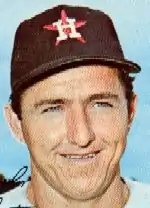John Bateman (baseball)
John Alvin Bateman (July 21, 1940 – December 3, 1996), was an American professional baseball catcher, who played in Major League Baseball (MLB) for the Houston Colt .45s / Astros, Montreal Expos, and Philadelphia Phillies. Bateman batted and threw right-handed. During his playing days, he stood 6 feet 3 inches (1.91 m) tall, weighing 210 pounds (95 kg).
| John Bateman | |||
|---|---|---|---|
 | |||
| Catcher | |||
| Born: July 21, 1940 Fort Sill, Oklahoma | |||
| Died: December 3, 1996 (aged 56) Sand Springs, Oklahoma | |||
| |||
| MLB debut | |||
| April 19, 1963, for the Houston Colt .45s | |||
| Last MLB appearance | |||
| October 3, 1972, for the Philadelphia Phillies | |||
| MLB statistics | |||
| Batting average | .230 | ||
| Home runs | 81 | ||
| Runs batted in | 375 | ||
| Teams | |||
Born in Killeen, Texas, Bateman grew up in Lawton, Oklahoma and attended Lawton High School. He signed with the expansion Houston Colt .45s, as an amateur free agent, in 1962. In 10 MLB seasons, Bateman compiled a .230 lifetime batting average; he ended his big league career with the Phillies.
Houston Colt .45s
Bateman clubbed 22 home runs for the minor league Modesto Colts in 1962, and made the Colt .45s out of spring training the following season as Jim Campbell's back-up behind the plate. Campbell, however, sputtered, and soon lost his starting job to Bateman. On May 17, 1963, Bateman caught the first ever no-hitter in Houston franchise history. Don Nottebart held the Philadelphia Phillies hitless in a 4–1 Houston win.[1] For the season, Bateman batted .210 while leading his team with ten home runs and 59 runs batted in. He then split time behind the plate with Jerry Grote in 1964.
Houston Astros
In 1965, the Colt .45s moved into their new domed stadium, The Astrodome (so-dubbed by team owner Judge Roy Hofheinz, in honor of Houston's importance to the USA Space Program). To match with the theme of the ballpark’s name, the team was renamed the Astros.[2]
During that first season in the immense new ballpark, Bateman struggled, ultimately spending almost half the season with the AAA Oklahoma City 89ers. While in the big leagues, he managed only a .197 batting average, with seven home runs — and spending only 39 games behind the dish — while backing up starting catcher Ron Brand.
In 1966, Bateman won back his starting job behind the plate, and set a franchise record with sixteen home runs by a catcher; that feat still stands today. (Although Jason Castro tied the mark in 2013 — only 16 were hit as a catcher — two as a DH.)
Montreal Expos
Bateman and Brand shared catching duties for the Astros through the 1968 season. On October 14, 1968, Bateman was drafted by the Montreal Expos as the sixth overall pick in the 1968 Major League Baseball expansion draft; 52 picks later, the Expos selected Brand, and the two resumed their platoon in Montreal. Bateman batted sixth in the inaugural game versus the New York Mets on April 8, 1969, going 1-for-5 in the 11-10 win. [3]
Like his unique "first" with the Astros, Bateman also caught the Expos' first no-hitter: the first of Bill Stoneman's two, on April 17, 1969 against the Philadelphia Phillies—in only the ninth game in the franchise's history.
In 1970 for Montreal, Bateman was 2nd on the team in Hits and Triples, 3rd on the team in HR, RBI, Doubles, Extra-base hits, and Stolen Bases. That season Bateman also led all MLB catchers in Stolen Bases with 8, and finished 25th in the National League in Power/Speed.
Bateman had a unique, if not trivial, place in Canadian history. He was a member of the Expos in October 1970, the same time the October Crisis was happening in the city. This was one of the most notorious and tense time in recent Canadian political history. On November 6, the hiding place of one of the FLQ terrorist cells was discovered. John Bateman loved hanging out with the police, and being a star on the new pro team in town, the Montreal police also loved his company. As retold on a television documentary about the history of the Expos, the manager Gene Mauch was watching these events with his staff on TV, and the camera focused on the hiding place in the house. And what do they see, on national TV, but John Bateman's bulky frame coming out of the hiding place. Evidently the police let him have some fun. Mauch was not amused.
Philadelphia Phillies
On June 14, 1972, Bateman was traded to the Philadelphia Phillies for Tim McCarver. He was released at the end of the season to make room for rookie prospect Bob Boone behind the plate. Steve Carlton was 7-6 with a 2.86 ERA before Bateman was traded to the Phillies. With Bateman catching the rest of Carlton's starts that season, Carlton was 20-4 with a 1.60 ERA. Carlton called Bateman the best signal caller he ever played with, and unsuccessfully lobbied the Phillies' front office to re-sign Bateman in 1973.
The King and His Court
Bateman toured with the Fast Pitch softball team The King and His Court from 1977 to 1980. He acquired his softball skills while playing for the Texas State Amateur Softball Champion Houston Bombers.
References
External links
- Career statistics and player information from MLB, or ESPN, or Baseball-Reference, or Fangraphs, or Baseball-Reference (Minors), or Retrosheet
- John Bateman at SABR (Baseball BioProject)
- John Bateman at Baseball Almanac
- John Bateman at Baseball Library
- John Bateman at Astros Daily
- John Bateman at Pura Pelota (Venezuelan Professional Baseball League)
- John Bateman at The King and His Court]